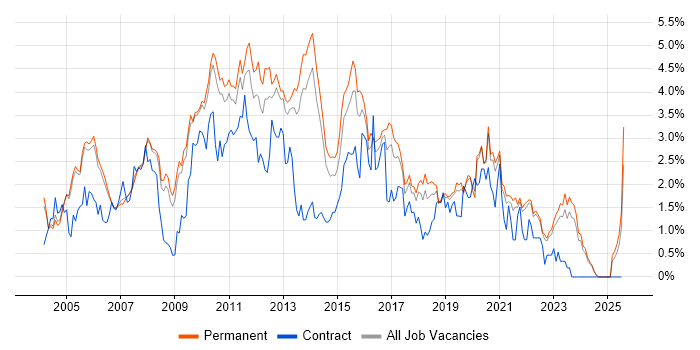Transact-SQL
South East > Oxfordshire
The table below provides summary statistics for permanent job vacancies advertised in Oxfordshire requiring T-SQL skills. It includes a benchmarking guide to the annual salaries offered in vacancies that cited T-SQL over the 6 months leading up to 24 August 2025, comparing them to the same period in the previous two years.
| 6 months to 24 Aug 2025 |
Same period 2024 | Same period 2023 | |
|---|---|---|---|
| Rank | 68 | 104 | 66 |
| Rank change year-on-year | +36 | -38 | +38 |
| DemandTrendPermanent jobs citing T-SQL | 2 | 1 | 16 |
| As % of all permanent jobs advertised in Oxfordshire | 0.28% | 0.073% | 1.74% |
| As % of the Programming Languages category | 1.11% | 0.27% | 4.73% |
| Number of salaries quoted | 2 | 1 | 16 |
| 10th Percentile | - | - | £27,500 |
| 25th Percentile | £51,250 | £56,250 | £56,875 |
| Median annual salary (50th Percentile) | £52,500 | £57,500 | £70,000 |
| Median % change year-on-year | -8.70% | -17.86% | +60.00% |
| 75th Percentile | £53,750 | £58,750 | £80,000 |
| 90th Percentile | - | - | - |
| South East median annual salary | £45,000 | £56,250 | £57,500 |
| % change year-on-year | -20.00% | -2.17% | +9.52% |
All Programming Languages
Oxfordshire
T-SQL falls under the Programming Languages category. For comparison with the information above, the following table provides summary statistics for all permanent job vacancies requiring coding skills in Oxfordshire.
| DemandTrendPermanent vacancies with a requirement for coding skills | 180 | 375 | 338 |
| As % of all permanent jobs advertised in Oxfordshire | 25.39% | 27.29% | 36.66% |
| Number of salaries quoted | 121 | 315 | 270 |
| 10th Percentile | £38,750 | £37,500 | £36,500 |
| 25th Percentile | £47,500 | £41,491 | £47,500 |
| Median annual salary (50th Percentile) | £62,500 | £50,845 | £60,000 |
| Median % change year-on-year | +22.92% | -15.26% | +15.38% |
| 75th Percentile | £70,000 | £62,500 | £75,000 |
| 90th Percentile | £83,750 | £76,500 | £81,250 |
| South East median annual salary | £60,000 | £55,000 | £58,250 |
| % change year-on-year | +9.09% | -5.58% | +5.91% |
T-SQL
Job Vacancy Trend in Oxfordshire
Job postings citing T-SQL as a proportion of all IT jobs advertised in Oxfordshire.

T-SQL
Salary Trend in Oxfordshire
Salary distribution trend for jobs in Oxfordshire citing T-SQL.

T-SQL
Job Locations in Oxfordshire
The table below looks at the demand and provides a guide to the median salaries quoted in IT jobs citing T-SQL within the Oxfordshire region over the 6 months to 24 August 2025. The 'Rank Change' column provides an indication of the change in demand within each location based on the same 6 month period last year.
| Location | Rank Change on Same Period Last Year |
Matching DemandTrendPermanent IT Job Ads |
Median Salary Past 6 Months |
Median Salary % Change on Same Period Last Year |
Live Jobs |
|---|---|---|---|---|---|
| Abingdon | +17 | 2 | £52,500 | -8.70% | 2 |
| T-SQL South East |
|||||
T-SQL
Co-occurring Skills and Capabilities in Oxfordshire by Category
The follow tables expand on the table above by listing co-occurrences grouped by category. The same employment type, locality and period is covered with up to 20 co-occurrences shown in each of the following categories:
|
|
||||||||||||||||||||||||||||||
|
|
||||||||||||||||||||||||||||||
|
|
||||||||||||||||||||||||||||||
|
|
||||||||||||||||||||||||||||||
